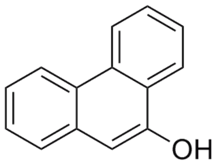Chemistry:9-Phenanthrol
From HandWiki

| |
| Names | |
|---|---|
| IUPAC name
9-Phenanthrol
| |
| Systematic IUPAC name
9-Hydroxyphenanthrene | |
Other names
| |
| Identifiers | |
3D model (JSmol)
|
|
| ChEBI | |
| ChEMBL | |
| ChemSpider | |
| EC Number |
|
| KEGG | |
PubChem CID
|
|
| UNII | |
| |
| |
| Properties | |
| C14H10O | |
| Molar mass | 194.233 g·mol−1 |
| Hazards | |
| GHS pictograms | 
|
| GHS Signal word | Warning |
| H315, H319, H335 | |
| P261, P264, P271, P280, P302+352, P304+340, P305+351+338, P312, P321, P332+313, P337+313, P362, P403+233, P405, P501 | |
Except where otherwise noted, data are given for materials in their standard state (at 25 °C [77 °F], 100 kPa). | |
| Infobox references | |
9-Phenanthrol is an aromatic alcohol derived from phenanthrene, a tricyclic compound. It is a TRPM4 channel inhibitor.[1] It can prevent the pancreas from secreting insulin when stimulated by glucose.[2]
References
- ↑ Guinamard, R; Hof, T; Del Negro, C A (2014). "The TRPM4 channel inhibitor 9-phenanthrol". British Journal of Pharmacology 171 (7): 1600–1613. doi:10.1111/bph.12582. PMID 24433510.
- ↑ Ma, Zuheng; Björklund, Anneli; Islam, Md. Shahidul (2017). "A TRPM4 Inhibitor 9-Phenanthrol Inhibits Glucose- and Glucagon-Like Peptide 1-Induced Insulin Secretion from Rat Islets of Langerhans". Journal of Diabetes Research 2017: 1–5. doi:10.1155/2017/5131785. PMID 29098165.
 |

